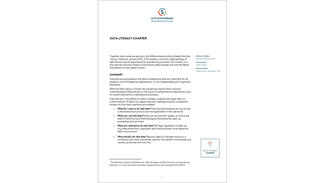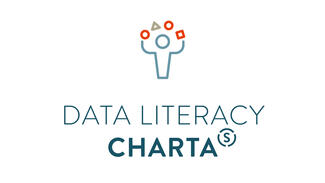

Together with numerous partners, the Stifterverband jointly initiated the Data Literacy Charter in January 2021. It formulates a common understanding of data literacy and its importance for educational processes. The Charter is in line with the German Federal Government's data strategy and with the Berlin Declaration on the Digital Society.
Auhors:
Katharina Schüller, Henning Koch, Florian Rampelt
Summary
Data literacy encompasses the data competencies that are important for all people in a world shaped by digitalisation. It is an indispensable part of general education.
With the Data Literacy Charter, the signatories express their common understanding of data literacy in the sense of comprehensive data literacy and its overall importance in educational processes.
Data literacy is the ability to collect, manage, evaluate, and apply data in a critical manner. If data is to support decision-making processes, competent answers to four basic questions are needed:
- What do I want to do with data? Data and data analyses are not an end in themselves but serve a concrete application in the real world.
- What can I do with data? Data sources and their quality, as well as the state of technical and methodological developments open up possibilities and set limits.
- What am I allowed to do with data? All legal regulations of data use (e.g. data protection, copyrights and licensing issues) must always be taken into account.
- What should I do with data? Because data is a valuable resource, a normative claim that it should be used for the benefit of individuals and society can be derived from this.
The supporters of the Data Literacy Charter see data literacy as a key competence for all people in the 21st century. It is the key to systematically transforming data into knowledge and actions.
Data literacy enables people, businesses, and scientific institutions as well as governmental or civil society organisations,
- to actively participate in opportunities to use data;
- to deal confidently and responsibly with one's own and other people's data;
- to use new drivers and technologies such as Big Data, Artificial Intelligence or Internet of Things to meet individual needs, address societal challenges and solve global problems.
Data literacy strengthens judgement, self-determination and sense of responsibility and promotes the social and economic participation of all of us in a world shaped by digitalisation.
Guiding Principles
Five principles characterise the importance and role of data literacy as a key competence of the 21st century. These create a common basic understanding and serve as a stimulus to jointly shape educational processes in a future-oriented way.
- Data literacy must be accessible to all people.
Data literacy serves to promote autonomy in a modern digitalised world and is therefore important for all people - not only for specialists. The aim of teaching data literacy is to ensure that each individual, and our society as a whole, deal with data in a conscious and ethically sound manner. Data literacy enables successful and sustainable action that is based on evidence and that adequately takes into account uncertainty and change in our living environment. We are therefore committed to ensuring that data literacy and the respective set of skills and competencies are widely taught and can be acquired by all people.
- Data literacy must be taught throughout life in all areas of education.
Data literacy must be anchored in all formal and non-formal education sectors and thus established as part of general education. To this end, we must continuously teach learners how data relates to their respective everyday lives: Data represents digital images of real phenomena, objects, and processes - this applies to all fields of application. How to collect or procure, evaluate, apply, and interpret data appropriately for the respective application must be systematically learned and practised. The basic concept of data literacy and its sub-areas therefore applies to all educational fields and levels, even if the desired level of competence may differ in each case.In concrete terms, this requires the inclusion of data literacy in the curricula and educational standards of schools, teacher training and higher education. Learners should not only be addressed as passive consumers of data. We rather want to enable them to actively shape data-related insights and decision-making. To make lifelong learning of data literacy possible, data literacy programmes for extracurricular and vocational training are also needed. We advocate the development and promotion of such programmes, for example in cooperation with adult education centres or public libraries.
- Data literacy must be taught as a transdisciplinary competence across all subjects from three perspectives
Data literacy involves three perspectives: the application-oriented (What is to be done?), the technical-methodological (How is it to be done?) and the socio-cultural (What is it to be done for?). We therefore want to ensure that data literacy is taught with a trans- and interdisciplinary approach. This includes
● the application-oriented perspective (for example, applications from the natural and engineering sciences, economics, medicine, psychology, sociology, linguistics, media studies, and many more),
● the technical-methodological perspective (for example, from the point of view of statistics, mathematics, computer science, and information science),
● the socio-cultural perspective (for example, reflection of legal, ethical, philosophical, ethnological, and inequality aspects)
● as well as the perspective of education (for example on the part of teaching, methodology, and educational science).
- Data literacy must systematically cover the entire process of insight and decision-making with data.
Data Literacy ensures that answers to real-world problems are found using data in a structured and quality manner. Along this process data literacy includes the following competence areas:
● Use and protect data (ability and motivation to responsibly acquire, analyse, and share data and to identify appropriate data and information in the context of the task at hand)
● Classify data and information derived from it (ability and motivation to contextualise and interpret data and information and to critically question learning systems, such as AI applications).
● Act in a data-driven way (open-minded attitude towards data in the sense of a data culture including insight into the role of data for evidence-based action, ability to deal with data in a sovereign manner including effective communication of data-based decisions).
- Data literacy must include knowledge, skills, and values for a conscious and ethically sound handling of data.
Data Literacy comprises three competence dimensions that must be mapped in all three competence areas. Each competence area is characterised by
● specific knowledge (dimension "knowledge"),
● the skills and competencies to apply this knowledge (dimension "skills") and
● the willingness to do so, i.e. the corresponding ethics, values, and attitudes (dimension "values").
Data ethics is a central component of any set of data-related skills and competencies and is reflected in all sub-areas of data literacy. This means that when data is collected, managed, evaluated and applied, in a critical manner, ethical aspects always play an important role. Data ethics, values, and attitudes contribute significantly to ensuring that not only the right means are used to solve problems with the help of data, but above all that the right goals are pursued: Data should make a sustainable positive con-tribution to society and therefore be used responsibly, context-sensitively, and with an ongoing reflection of possible future consequences.
The signatories of the Data Literacy Charter will take measures to spread this understanding of data literacy and to further strengthen the associated competencies. They call on other interested parties to do the same within their sphere of competence.
PDF download

Contact

Dr. Henning Koch
Programme manager
T 030 322982-314